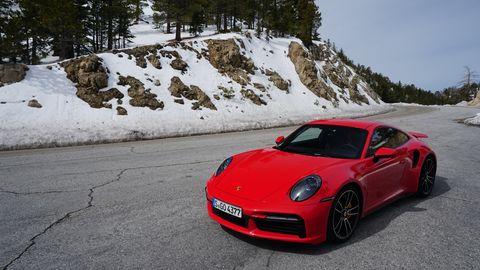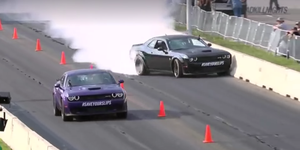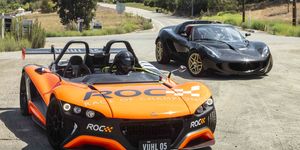Alleged absenteeism stemming from the coronavirus outbreak encouraged General Motors to place salaried volunteers on assembly lines in Wentzville, MO. This has not gone over well with the UAW, which suggests GM’s decision to utilize non-union staff is in direct violation of its 2019 labor contract. The union claims white-collar workers have no business being on assembly lines and has issued a formal warning to the automaker.
Thursday, August 27, 2020
Tuesday, August 18, 2020
Replacing the market with bureaucratic fiat and how is charging up your electric car going in power outage areas.
The California Air Resources Board (CARB) made a slew of announcements on Monday regarding what types of vehicles will be allowed within the confines of its borders. These included everything from proclaiming aftermarket parts would be subject to a faster approval (or denial) process in the future, to announcing a joint initiative with 15 other states (most of whom joined CA in opposing the fuel efficiency rollback), to accelerating the implementation of electrified buses and trucks.
It also confirmed that California has finalized binding agreements with several automakers to cut vehicle emissions. BMW, Ford Motor Co., Honda Motor Co., and Volkswagen Group all entered into a voluntary agreement with the Golden State to adhere to Obama-era emission mandates last summer. While this prompted the U.S. Justice Department to launch an antitrust investigation into the deal, no action was taken. CARB said those companies — and some of their friends — made a binding commitment to California this month and will commit to its new emission targets, rather than the revised quotas set by the federal government.
While the DOJ didn’t seem to think California had crossed any lines when voluntarily agreements were announced in 2019, the White House also didn’t seem to push back all that seriously. New concessions by the Trump administration’s fuel mandate, which changed to require 1.5 percent annual increases in efficiency through 2026 in its final draft, was assumed to be a sufficient compromise.
Automakers who wanted to go beyond were always welcome to do so. But you could tell the administration didn’t care for industry players making overt alliances with California.
CARB said Volvo Cars (owned by China’s Geely Holdings) has joined Ford, Honda, VW Group and BMW (which includes Rolls-Royce) in signing official agreements with the state to adhere its emission rules. They’re also required to commit themselves to “the legal authority of the California Air Resources Board.” Though this is all still technically “voluntarily” — with the language seeming to exist to avoid any additional scrutiny form the Justice Department regarding the industrial pact.
From CARB:
The framework agreements are voluntary commitments that support continued annual reductions of vehicle greenhouse gas emissions through the 2026 model year, encourage innovation to accelerate the transition to electric vehicles, provide industry the certainty needed to make investments and create jobs, and save consumers money.
The auto companies party to the voluntary agreements will stay on course to make cleaner cars consistent with their individual production plans to substantially electrify their respective fleets and cut greenhouse gas emissions. The other states that have previously adopted California’s cleaner vehicle standards have notified each of the Framework automakers by letters that they will also support the Framework agreements.
Each of the automobile manufacturers that have finalized Framework agreements have made additional and individual commitments to expedite the transition to zero-emission vehicles. These agreements, designed to further advance innovation and investment, are memorialized in a separate appendix for each company, and are designated as Confidential Business Information because they relate to specific model production plans and similar matters. Generally they promote enhanced distribution of zero emission vehicles.
The issue has been overtly political since day one, with Dems saying any pushback against California amounted to bullying. Meanwhile, Republicans in support of the White House’s fuel rollback bemoaned the West Coast for intentionally trying to undermine its authority and exercise its influence over the rest of the nation. Frankly, it’s difficult to argue against either claim. Despite Obama-era emission mandates being dubbed untenable by the administration that penned it, any negations/changes have been mired in political grandstanding and a lack of cooperation.
However, both sides actually made concessions. The Environmental Protection Agency allowed the rollback to be a little tougher on emissions than originally planned, and the California Air Resources Board’s plan is actually a tad less stringent than the standards finalized by the Obama administration. You’ll never hear either side proudly admitting this.
Looking through the framework provided by California (available here), there doesn’t seem to be anything prohibiting automakers from selling vehicles that don’t meet the targets in states that haven’t agreed to follow its path. That should help avoid trouble in any future antitrust investigations. While it could also be argued that no automaker would bother building for two markets, it falls short of being able to claim there’s an industrial cartel afoot.
General Motors, Fiat Chrysler Automobiles, and Toyota were previously shamed by Sen. Tom Carper of Delaware for not adhering to Californian law. “Instead of choosing the responsible path forged by four automakers and the state of California, one that will move us toward the cleaner, alternative fuel vehicles of the future, these companies have chosen to head down a dead-end road,” Carper said in 2019.
But the public outrage they were presumed to receive for not advancing the green mindset hasn’t manifested. No boycotts sprang up, and some even praised the brand for not going along with the crowd. Most of the opposition to California comes by way of private transportation costs. Critics often note California’s extremely high energy bill and the lofty MSRPs associated with electric vehicles. Automakers not involved in the state-based pact said they want to provide the kind of products people want — whether those be hyper-efficient models or a big bruiser with a large, gas-powered engine.
That said, most just want to be able to predict where the regulatory needle will be in a few years. Even those that signed on with CARB suggest they’d have preferred a nationwide standard across the United States. However, accompanying California offers an excellent opportunity to virtue signal, while setting higher targets means not getting caught with their pants down if the next administration tries to roll back the rollback.
[Image: Siripatv/Shutterstock]
Friday, July 24, 2020
Wonder why they didn't pick California? Bwahaha!
Tesla Picks Texas for Cybertruck Factory

Thursday, June 4, 2020
Saturday, May 23, 2020
Politicians and bureaucrats live in the world of permissions where the first answer is no to protect their behinds
Look how in lockstep these petty politicians become when given the slightest power. It's why socialist societies that live at the behest of these fine print men fail to innovate.
You Can't Stop the Woodward Dream Cruis
Sunday, May 17, 2020
2400+ CHP tickets a month for 100+ mph speeding
The Roads Are Nearly Empty, and People Are Driving like Idiots


Wednesday, May 13, 2020
Proving the AMG badge on a MB is not fluff.
308 km/h on #QEW #Burlington. 191MPH 280ft/sec 85m/sec
19 year old driver charged with #StreetRacing and Criminal Dangerous Driving. #7DayLicenceSuspension #7DayVehicleImpound
Saturday, April 4, 2020
Friday, April 3, 2020
Milage standards are not being rolled back....













